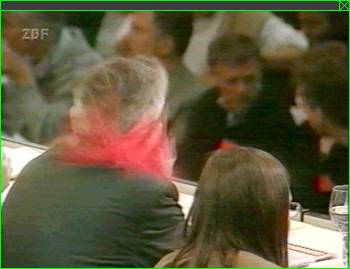
 Among the obvious consequences of the NATO attacks that will, in
my opinion, have to be analyzed in future discussions, are (in no
particular order)
Among the obvious consequences of the NATO attacks that will, in
my opinion, have to be analyzed in future discussions, are (in no
particular order)
* the political strengthening of Milosevic and the elimination of
any inner-Yugoslav opposition. Specifically, the war, like the wars
in Croatia and Bosnia before it, provides Milosevic with a perfect
explanation why the promises of a better life for the population
will not be realized - it is war, after all. If an issue out of the
current demonizing discourse can be found, it is possible that the
reasserted power position of Milosevic may pave the way for a
regional order in which NATO assigns him the role of a co-guarantor
of the regional stability - at conditions conforming to NATO and IMF
plans;
* a massive provocation towards the Russian leadership that can
be interpreted as an attempted revival of the politics of
containment followed by NATO/the US towards the "Soviet" Union
during the times of the Cold War. This may have been part of a
scheme to evaluate the resistance likely to be opposed by the
Russian leadership to the ongoing US policies aimed at directly
disputing the sphere of influence of the Russian government around
the Caspian Sea and the Caucasus;
* the liberation of Germany from the military isolation imposed
by the post-war order, by breaking the taboo of a Bundeswehr (the
army of Federal Germany) intervention against Yugoslavia. This may
have been the single greatest motive of German politics to enter
into a war against Yugoslavia within the NATO framework. After this
tactical use, NATO has served its main purpose as a hegemonic power
and Germany, together with France, may further on prefer to cut back
NATO to the role of a military alliance among several others;
* the confirmation of US supremacy, including over EUropean
"defense" policies, through the leading role taken by the US
government in the NATO bombings. This situation could easily swing
around to a substantial loss of US-American power over the EUropean
"defense" system, however. Germany has become more independent by
breaking out of the military isolation and is more susceptible to
accept French offers for a military collaboration in the context of
the Western European Union (WEU). Furthermore there is a danger of
NATO being discredited to the extent that the reasons given for the
intervention are in obvious contradiction to the consequences of the
bombings - to the detriment of the US and to the benefit of the
German and French governments;
 * the displacement of hundreds of thousands of people, mostly
Kosov@ Albanians, from Kosov@, with two far-reaching consequences: a
massive migration of refugees to neighboring countries and in more
or less controlled ways[9] to Western European countries as cheap
and extremely dependent labor; the destabilizing of Albania and
Macedonia that in essence turns those two countries into NATO
protectorates. In addition, one can be sure that the massive
expulsion of Albanians precipitated by the NATO bombings was
envisaged by NATO strategic planning to serve as the heart of its
own war-mongering discourse of legitimation;
* the displacement of hundreds of thousands of people, mostly
Kosov@ Albanians, from Kosov@, with two far-reaching consequences: a
massive migration of refugees to neighboring countries and in more
or less controlled ways[9] to Western European countries as cheap
and extremely dependent labor; the destabilizing of Albania and
Macedonia that in essence turns those two countries into NATO
protectorates. In addition, one can be sure that the massive
expulsion of Albanians precipitated by the NATO bombings was
envisaged by NATO strategic planning to serve as the heart of its
own war-mongering discourse of legitimation;
* also in connection with the mass expulsions, the destruction of
the subsistence structures which stood in the way of capital
accumulation by providing an alternative to being exploited at low
wages. This time, the destruction of social structures aimed
especially at the Kosov@ Albanian clans. In the context of the past
Yugoslav civil wars such destruction has been identified as a
substantial interest in war for the Yugoslav leadership under the
pressure of IMF programs (see Materialien Nr. 6). The destruction of
subsistence structure is thus in the interest of both Milosevic and
the Western powers;
* at least a temporary weakening of the EUropean economy as
compared to the US-American. This has become visible through the low
exchange rate of the Euro to the US dollar. Presumably, US
strategists do not mind waging a war in EUrope's backyard and
imposing the consequences of a possible destabilization on their
greatest economic competitor and NATO-partner;
* the destruction of substantial parts of the Yugoslav industry
and infrastructure that have been the target of bombings far more
often than military installations. A reconstruction based on foreign
loans will make Yugoslavia economically dependent for a long time to
come and force it to pay interests. Much like in Kuwait, thanks to
its leading role in the war the US government is likely to position
US companies well in the business of reconstruction. Even as the
German diplomacy is trying to grab the initiative by proposing a
"Marshall Plan for the Balkans", it will be hard for the EU to be
more than a junior partner to the US. In case such a Marshall Plan
turns the dependence of Yugoslavia on loans in a dependence on the
"donor countries", this will be just another opportunity for the
latter to implement a redistribution from the bottom to the top. Tax
money will serve to finance the profits of (US and German)
transnationals in Yugoslavia;
 * a military-Keynesian solution of parts of the overproduction
crisis in the US, and to a smaller extent in the EU, through the
massive use (the "consumption" paid through taxes) of weapons. This
has the side effect of providing a gigantic live weapons show as a
state subsidized advertising opportunity for transnational arms
companies;
* a military-Keynesian solution of parts of the overproduction
crisis in the US, and to a smaller extent in the EU, through the
massive use (the "consumption" paid through taxes) of weapons. This
has the side effect of providing a gigantic live weapons show as a
state subsidized advertising opportunity for transnational arms
companies;
* a solution to the question of where the US soldiers thus far
stationed in Germany should go, if they haven't already been
transferred to Iraq, or later to Bosnia. With the de facto NATO
protectorates in Macedonia and Albania and the planned protectorate
in Kosov@ (according to Annex B of the Rambouillet agreement in all
of Yugoslavia) there is now sufficient work for those soldiers
otherwise threatened with unemployment;
* an increased pressure on the state governments of the region to
act in accordance with their candidacy for NATO accession, and test
runs for NATO loyalty. The Bulgarian government for instance was -
as Bulgarian media commented - not asked to provide an air corridor
to NATO planes for any war strategic use, but in order to test the
political willingness of bowing to the will of NATO against the will
of the population;
* the fact that the acceptance for a division or separation of
Kosov@, and in the medium term maybe of Macedonia, has grown
internationally. If we examine the main argument given for the
inalterability of state borders, namely the fear that other
minorities in Europe might follow the example of the Kosov@
Albanians, we notice that this argument loses its stringency if the
price of their sovereignty becomes so high that anyone who might
fancy to walk in their footsteps would be thoroughly discouraged.
This paves the way for the continuation of the splitting up of the
Balkans according to "ethnic" criteria, or whatever criteria may
suit the economic and geostrategic interests of the Western
powers;
* a strengthened KLA leadership. In this context we can expect
that especially the US, after the weakening of Yugoslavia and
Macedonia, will not risk the creation of a Greater Albania under the
leadership of the KLA or other forces. It would therefore not be
surprising if the KLA was used as cannon-fodder and thus wiped out
in the war - for instance by being armed so as to serve as ground
troops of NATO and being sent to fight an overwhelmingly stronger
Yugoslav army.[10] Albania is useful for the US as a submissive and
extremely dependent state government. If however a self-assured
Kosov@ Albanian leadership emerges from the war in full strength and
kicks off a dynamic of independence, this does not lie in the
interest of the US government who wants especially to control trade
routes in the region and to that end needs obedient governments. As
opposed to Germany, that has, as we mentioned earlier, supported the
KLA at an early stage and apparently finds such a dynamic more
promising.
Yugoslavia as a center of East-West trade
 The importance of East-West trade routes stems from the already
mentioned US interests in an enlargement of the US sphere of
influence coinciding with a containment of the Russian influence
around the Caspian Sea and the Caucasus. Thinking one step further,
it is also about the revival of the old silk route all the way to
China, with the important detail that Russia is to be bypassed, but
at the same time alternatives are to be created to the Turkish route
in order to take the edge off Turkey's crucial strategic importance.
Since I have not yet seen these trade strategic reflections
expounded in a publicly available source, and since the US hegemony
in the Atlantic Alliance continues despite all the wounds incurred,
I would like to elaborate on this a bit.
The importance of East-West trade routes stems from the already
mentioned US interests in an enlargement of the US sphere of
influence coinciding with a containment of the Russian influence
around the Caspian Sea and the Caucasus. Thinking one step further,
it is also about the revival of the old silk route all the way to
China, with the important detail that Russia is to be bypassed, but
at the same time alternatives are to be created to the Turkish route
in order to take the edge off Turkey's crucial strategic importance.
Since I have not yet seen these trade strategic reflections
expounded in a publicly available source, and since the US hegemony
in the Atlantic Alliance continues despite all the wounds incurred,
I would like to elaborate on this a bit.
An essential reason why the lack of submissiveness and
reliability (seen from a Western-imperialist perspective) of the
Yugoslav government was so annoying was that trade routes that are
important for the future pass through Yugoslavia with practically no
alternative and thus depend on the goodwill of the Yugoslav
government. In circles dealing with investment strategies Yugoslavia
is seen as a country that (both before and after 1989) has misused
its geographic position in order to control trade routes - both the
overland route from Bulgaria and Macedonia through Belgrade to the
West and the Danube shipping route. NATO strategists could have a
good laugh about such attempts at monopolizing if they had ready
alternatives. Besides the route going through the Bosporus, where in
the case of oil, for instance, the limits of capacity have already
been reached and substantial ecological danger and logistic problems
are arising, alternatives to the route through Belgrade or the
Danube have not been developed.
However, the current trade policies of the Western powers, and
especially of the US, build upon the notion that a multitude of
alternatives should be opened in order to reduce dependencies. If it
had been possible to develop these alternatives earlier the Yugoslav
government would have been missing an essential trump card and would
have been much more exposed to Western attempts at intimidation and
threats of embargo. Then, the "Yugoslav nut" might possibly have
been cracked without a war. Even if for the NATO countries there was
a whole set of other reasons for escalating towards a war, the
probability that sufficient support for the war might have been
assured would have been substantially lower. The development in good
time of alternative trade routes was hindered both by diverging
priorities among Western powers and mutually incompatible transport
policies of the Balkan countries, combined with a lack of funds for
infrastructure investment. In order for foreign investment to flow,
the unwritten trade rules of the Balkan countries, which are not
understandable to Western businesspeople, had to be abolished. The
difficulties of understanding stemmed mainly from the fact that
these rules were much too awkward for effectively imposing Western
profit interests. Through the policies of "development" banks like
the World Bank and the European Bank for Reconstruction and
Development (EBRD) those rules were substituted by a business system
of Western type that favors Western companies and essentially
excludes the local firms.
 The conditions for the development of trade routes are given by
the interplay between local/regional interests and the requirements
of interregional trade. The transport connections between Bulgaria
and Romania, for instance, which would provide a way to bypass
Belgrade on the way to the north-west, remain poor - only a single
bridge far in the East and a few ferries, for a border of no less
than five hundred kilometers. As long as the Bulgarian government
insists on building the new bridge in Vidin, 20 kilometers from the
Yugoslav border, the Romanian government will never agree. The
latter has no interest in developing trade over the
Bulgarian-Romanian border, since the master plan of Romanian
transport politics is aimed at developing East-West trade from the
Romanian Black Sea port of Constanta to Hungary and onwards. The
construction of a new bridge over the Danube would open Constanta to
the competition of the Bulgarian ports of Varna and Burgas. Hence
the interest of Western powers - in this case not so much the US as
Germany and Austria - in alternative routes and flexibility will be
realized only if the Romanian government can be offered sufficient
compensation. The war of NATO against Yugoslavia now offers a
coercive environment in which the Romanian government may be brought
to agree to a bridge, as long as its location ensures that the
traffic through Romania - and not only through a small corner in the
west between Bulgaria and Hungary - is developed. Furthermore a
bridge further away from the Yugoslav border could satisfy the needs
of two trade routes, namely - besides the one mentioned - a
south-north route from Turkey and Greece whose inclusion in such a
project would make it interregionally more attractive and would make
the investments more profitable.
The conditions for the development of trade routes are given by
the interplay between local/regional interests and the requirements
of interregional trade. The transport connections between Bulgaria
and Romania, for instance, which would provide a way to bypass
Belgrade on the way to the north-west, remain poor - only a single
bridge far in the East and a few ferries, for a border of no less
than five hundred kilometers. As long as the Bulgarian government
insists on building the new bridge in Vidin, 20 kilometers from the
Yugoslav border, the Romanian government will never agree. The
latter has no interest in developing trade over the
Bulgarian-Romanian border, since the master plan of Romanian
transport politics is aimed at developing East-West trade from the
Romanian Black Sea port of Constanta to Hungary and onwards. The
construction of a new bridge over the Danube would open Constanta to
the competition of the Bulgarian ports of Varna and Burgas. Hence
the interest of Western powers - in this case not so much the US as
Germany and Austria - in alternative routes and flexibility will be
realized only if the Romanian government can be offered sufficient
compensation. The war of NATO against Yugoslavia now offers a
coercive environment in which the Romanian government may be brought
to agree to a bridge, as long as its location ensures that the
traffic through Romania - and not only through a small corner in the
west between Bulgaria and Hungary - is developed. Furthermore a
bridge further away from the Yugoslav border could satisfy the needs
of two trade routes, namely - besides the one mentioned - a
south-north route from Turkey and Greece whose inclusion in such a
project would make it interregionally more attractive and would make
the investments more profitable.
For the United States another overland route is of much higher
geostrategic importance - corridor VIII. This corridor runs from the
Black Sea through Bulgaria, Macedonia and Albania to the
Mediterranean and is part of the transport political priorities of
all three of these countries. The aim of US politics is to bring it
under the control of international institutions and its advisors.
This foreign interest suits the three Balkan countries to the extent
that they are hoping it will help them break out of a transport
political isolation - Albania is completely isolated towards the
east, Macedonia is connected only towards the north and the south,
and Bulgaria is too dependent on Yugoslavia to the west. In contrast
to some of the other EUropean corridors, corridor VIII does not play
a significant role on an intra-EUropean level (its "integrative
force" is low for EUrope, say analysts who are close to investment
circles). The corridor VIII receives its full strategic significance
only when it is seen as part of an outreaching route leading to the
Caspian Sea and further on to China. For the USA this corridor is
therefore of outstanding importance, and the weakened governments of
Albania and Macedonia (a significant consequence of the war moves of
NATO) come just in time as forcibly obedient servants of US
politics. Besides this, Bulgaria is not known for its affirmed
independence from Western institutions, since it has been made
dependent through Western loans and through the tactical promise
that it will catch up to a Western standard of living by joining
NATO and the EU.[11]
A trade corridor running through easily controlled countries
offers the US the opportunity to reduce its dependency on current
trade routes through Turkey and Greece and to get a tighter grip on
its two NATO partners. On an economic level, the direct winner would
be Italy, which would profit from the fact that Albania, through
which the goods would transit and reach the Mediterranean, does not
itself have the necessary infrastructure to serve as a distribution
center for goods and raw materials arriving from the East.
 The corridor VIII does not run directly through Kosov@, even if
the most likely route runs as close as 20 kilometers from the
Macedonian border to Kosov@. The war of NATO against Yugoslavia can
certainly not be explained exclusively from the fact that the US
have an interest in controlling trade routes and playing one route
against the other. Such an aim would never have found the approval
of the NATO partner countries. Notably in matters of the development
of trade routes, the interests of Germany and the United States
diverge substantially. What they do have in common is that
Yugoslavia is to be bypassed if possible. For the US - to the south
towards the Mediterranean. For Germany - to the north. Nevertheless,
for parts of the US establishment the corridor VIII, in addition to
the search for a legitimation of NATO as police unit, is likely to
have been an important part of their strategic thinking. And more
generally, the powerful position of the Yugoslav government stemming
from its control over the trade routes developed so far was
certainly on the agenda of German and other strategizing
meetings.
The corridor VIII does not run directly through Kosov@, even if
the most likely route runs as close as 20 kilometers from the
Macedonian border to Kosov@. The war of NATO against Yugoslavia can
certainly not be explained exclusively from the fact that the US
have an interest in controlling trade routes and playing one route
against the other. Such an aim would never have found the approval
of the NATO partner countries. Notably in matters of the development
of trade routes, the interests of Germany and the United States
diverge substantially. What they do have in common is that
Yugoslavia is to be bypassed if possible. For the US - to the south
towards the Mediterranean. For Germany - to the north. Nevertheless,
for parts of the US establishment the corridor VIII, in addition to
the search for a legitimation of NATO as police unit, is likely to
have been an important part of their strategic thinking. And more
generally, the powerful position of the Yugoslav government stemming
from its control over the trade routes developed so far was
certainly on the agenda of German and other strategizing
meetings.
Invitation
The reflections on a possible radical leftist approach to the war
of NATO against Yugoslavia and that of the Yugoslav leadership
against the Kosov@ Albanians and on possible ways to revive
arguments based on economic and social power interests that were
presented in this article are sketchy, incomplete and not
sufficiently well thought-out to give us the tools to act. In fact,
they are meant rather as food for thought and action, as a possible
starting point for further discussions and the search for
appropriate forms of action and communication. I would be happy if
readers who are interested in participating in such a process
contacted me.[12]
NOTES
1 The spelling Kosov@ is chosen in the tradition of the
gender-neutral Spanish spelling which combines the alternatives "a"
and "o" into the @ sign. This provides a way of avoiding having to
choose between the partisan spellings Kosovo (the Serb neuter
stemming from the historical, nationalistically tainted name of the
place "Kosovo Polje", which translates to "Field of the Blackbirds")
and Kosova (its variant used in Albanian language).
2 Both e-mail lists can be subscribed to by sending e-mail to
<majordomo@zamir.net> with the command "subscribe
ex-yu-a-lista" or "subscribe attack", respectively, in the body of
the e-mail. Most of the contributions are in "the language we
speak", as Yugoslavs sometimes call the South-Slavic language that
has by now received separate names according to nationalist
interests, and sometimes also in English.
3 Ethnisierung des Sozialen - Die Transformation der
jugoslawischen Gesellschaft im Medium des Krieges. Materialien für
einen neuen Antiimperialismus Nr. 6, Berlin/Göttingen 1993.
(Ethnicizing the social fabric - The transformation of the Yugoslav
society in the medium of war. Materials for a new
Anti-Imperialism)
4 Marcel Noir: "Unser Mann in der OSZE". (Our man in OSCE) In:
Jungle World, 14 April 1999.
5 Interim Agreement for Peace and Self-Government in Kosovo,
Rambouillet, France - 23 February 1999. And especially its Appendix
B: Status of Multi-National Military Implementation Force. Available
on the Web at <http://www.law.pitt.edu/kosovo.htm>.
6 Boris Buden: "The official Bastard (ARKZIN)-statement on the
war in Yugoslavia - Saving Private Havel", 20 April 1999.
7 The anti-Germans are a faction of the German left that has had
the merit to reintroduce important historical questions (especially
the relation to historical Nazism) into the political discussion but
sometimes tends to take Germany and its importance too seriously in
an almost narcissistic sense.
8 Roger Faligot: "How Germany backed KLA". In: The European, 21
September 1998.
9 Note added at translation: As shown by Helmut Dietrich, another
effect of the war is that through the presence of NATO troops in
Albania and Macedonia where most of the refugees transited made it
possible to successfully isolate the refugees and prevent them from
making contact with people who could help them pass the borders into
Italy and on to Switzerland and Germany. An even tighter control was
made possible by the fact that the refugee camps are under NATO
supervision. Cf. Helmut Dietrich, "Europäische Flüchtlingspolitik
und der NATO-Krieg - Die Zerschlagung der Fluchtwege aus dem Balkan
nach Westeuropa" (European Refugee Politics and the NATO war - The
dismantling of flight routes from the Balkans to Western Europe),
Widerspruch No. 37 (July 1999), Zurich, Switzerland.
10 Note added at translation: Although as predicted here, soon
after the publication of this article an outright anti-KLA
propaganda started in the world media, it seems that the position of
the KFOR (Kosovo Force) command towards the KLA structures is more
ambiguous than I had supposed, and the KLA leadership is given the
opportunity to ascertain its power and - as Bulgarian media surmise
and KLA officers openly admit - position themselves for the next
round of the struggle for a Greater Albania. We had better keep an
eye on developments in Macedonia.
11 In the context of NATO interests in corridor VIII it may be
interesting to note that Salomon Passi, the chairman of the Atlantic
Clubs in Sofia, an association which de facto represents the
interests of NATO, has served as an intermediate in the negotiations
for an infrastructure deal between a US-American company and the
port authorities of Burgas.
12 My e-mail address: <kessi@bitex.com>; Tel/Fax:
+359-2-980 96 52.